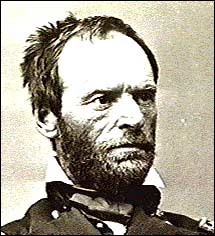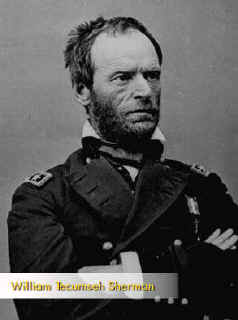


8th American History
Rossville Jr. High
Plain History Project
2004
|
|
|
| General Sherman used the same tactics in the west as he did in the Civil War. He brought hundreds of foot soldiers and cavalry also with them he brought the hell and fire of the Civil War. It was his tactics of attacking the Indians economic basis that finally brought an end to the wars on the plains. |  |
| Born in Lancaster, Ohio in 1820, Sherman was the son of a State Supreme Court judge. Sherman was named after Tecumseh, a Shawnee Chief. When Sherman was nine his father died of Typhoid fever. Lawyer and family friend Thomas Ewing adopted and raised him. An appointment to West Point was secured by Ewing for Sherman. He graduate six in his class of forty-two in 1820 after a career as a cadet. He served in Carolina, Georgia, and Florida, but the nature of his assignments there and during the Mexican-American War disappointed Sherman. | |
| Sherman resigned in 1853 to be a banker, then a lawyer, both with very little success. Civilian life bored him and he found it unprofitable. He applied for, and received the position of superintendent of the military academy in Alexandria, Louisiana. A second home to Sherman was the south. He knew a painful decision was coming with the approaching conflict between the North and The South. Sherman chose to join the Union as a colonel even though the Confederates offered him a high-ranking position in their new military. Sherman asked the President to replace him after the shock and confusion at Bull Run; instead of replacing him President Lincoln promoted him to brigadier general. This new command brought him lasting fame for the path of burning buildings and scorched fields he cut through the South. | |
| The press and Sherman had many conflicts. The press named him "Crazy Sherman". General Henry W. Halleck saved Sherman's military career. According to historians, in 1861 Sherman suffered a nervous breakdown. Halleck was instrumental in transferring him to Missouri for respite. Sherman's wife received a letter from Sherman admitting that he had considered suicide. His wife wrote Halleck for concern for of her husband; his reply stated: "I will willing take all that the newspaper said about Sherman if he will take all that they said about me for I am certain to gain by the experience." | |
| The Army turned it's attention west after the Civil War. It's attention was on the people who stood in it's way of expansion of the west. Sherman spoke fondly of the west and of the frontiersmen who settled it; he described the Indians as "a class of savages displaced by the irresistible progress of our race. Treachery is inherent in the Indian character." Sherman showed his attitude toward the Indians with these two statements: "The more we can kill this year the less will be have to be killed the next war. They have to be killed off or maintained as a series of paupers." "All Indians that will not move on to reservations are hostile and will remain so until killed off." | |
| In 1869 Grant appointed Sherman to be the commanding general of the Army, in this position he directed a series of campaigns that eventually crushed Indian resistance. He used the position to turn opinion into action. Sherman only moved the headquarters of the army to St. Louis to be farther away from Washington and it's slick politicians. Sherman attacked the Indians economic bias once commenting to General Sheridan that "it would be wise to invite all of the sportsmen of England and America for a Grand Buffalo Hunt." He attacked in the winter when supplies and mobility was limited. | |
| Sherman and his escort were bypassed by an Indian war party that had received information for an ambushed by an tribal leader. The leader said that they must waited for the second group. The violation of the peace outraged Sherman. Indians saw the attack as a justice for many wrongs, they did not see it as a crime. Sherman's reaction to the Kiowa raid was to capture Santanta . They captured him at a parley and tried him for murder. He was sentenced him to life imprisonment. He began the Red River campaign; by the late 1870's most free roaming tribes were forced onto reservations. |  |
| He retired in 1884 and refused to run for Presidency but was an avid speaker. He died of Pneumonia shortly after turning seventy-one. | |
| Scott Mckenzie
8th American History Rossville Jr. High Plain History Project 2004 |
|